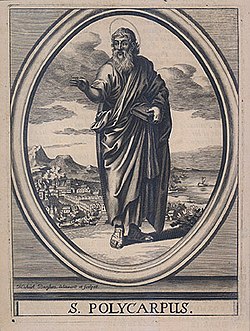Saint Polycarp
| Saint Polycarp | |
|---|---|

S. Polycarpus, engraving by Michael Burghers, ca 1685
|
|
| Martyr, Church Father and Bishop of Smyrna | |
| Born | AD 69 |
| Died | 156 Smyrna, Asia, Roman Empire |
| Venerated in |
Eastern Orthodox Church, Oriental Orthodox Church, Roman Catholic Church, Anglican Communion, Lutheran Church |
| Feast | February 23 (formerly January 26) |
| Attributes | wearing the pallium, holding a book representing his Letter to the Philippians |
| Patronage | against earache, dysentery |
| Major works | Polycarp's letter to the Philippians |
Polycarp (Greek: Πολύκαρπος, Polýkarpos; Latin: Polycarpus; AD 69 – 155) was a 2nd-century Christian bishop of Smyrna. According to the Martyrdom of Polycarp he died a martyr, bound and burned at the stake, then stabbed when the fire failed to touch him. Polycarp is regarded as a saint and Church Father in the Eastern Orthodox, Oriental Orthodox, Catholic, Anglican, and Lutheran churches. His name 'Polycarp' means 'much fruit' in Greek.
It is recorded by Irenaeus, who heard him speak in his youth, and by Tertullian, that he had been a disciple of John the Apostle.Saint Jerome wrote that Polycarp was a disciple of John and that John had ordained him bishop of Smyrna.
The early tradition that expanded upon the Martyrdom to link Polycarp in competition and contrast with John the Apostle who, though many people had tried to kill him, was not martyred but died of old age after being exiled to the island of Patmos, is embodied in the Coptic language fragmentary papyri (the "Harris fragments") dating to the 3rd to 6th centuries. Frederick Weidmann, their editor, interprets the "Harris fragments" as Smyrnan hagiography addressing Smyrna–Ephesus church rivalries, which "develops the association of Polycarp and John to a degree unwitnessed, so far as we know, either before or since". The fragments echo the Martyrology, and diverge from it.
...
Wikipedia
